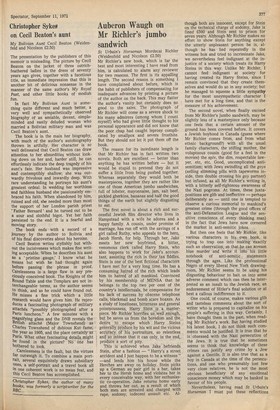Christopher Sykes on Cecil Beaton's aunt
My Bolivian Aunt Cecil Beaton (Weidenfeld and Nicolson £2.50) The presentation by the publishers of this memoir is misleading. The picture by Cecil Beaton on the jacket of three ostrichfeathered ladies in the dress of seventy years ago gives, together with a facetious title, an immediate impression that this is another bit of delicious nonsense in the manner of the same author's My Royal Past, and other little books of modish fun.
In fact My Bolivian Aunt is something quite different and much better, a very well and sympathetically observed biography of an amiable, decent, simpleminded and easily deluded woman who married a Bolivian military man and was Cecil Beaton's aunt.
The book is in the main her biography, with much of the author's autobiography thrown in artfully. Her character is so well delineated that Cecil Beaton can draw attention to her absurdities without looking down on her and, harder still, he can effortlessly indicate the deep tragedy of his aunt's fate. Her husband was impressive and contemptibly shallow; she was outwardly frivolous and inwardly deep. With rare understanding he portrays his aunt's greatest ordeal. In wedding her worthless and faithless husband she passionately embraced his faith. When abandoned by him, ruined and old, she needed more than most the support of her London parish priest 'Father Bernard' and he turned out to be a sour and slothful bigot. Yet her faith persisted to the end. It is a fearful and moving story.
The book ends with a record of a Journey by the author to Bolivia and of his final discoveries about his heroine.
Cecil Beaton writes stylishly but without the incisiveness which makes fine writing acceptable. When he describes his aunt as a pristine gauge,' I know what he means but wish he had thought again before passing the phrase in proof. Carelessness is a large flaw in any preciously conceived book. The Knights of the Round Table and the Templars are not interchangeable terms, as the author seems to think, and as he could have found out. He misses a fine trick which a little research would have given him. He reproduces a fascinating photograph of military attaches "possibly photographed after a Paris luncheon." A few minutes with a magnifying glass and the DNB reveals the British attaché (Major Townshend) as Charles Townshend of dubious Kut fame, the year as 1905, and the place certainly as Paris. What other fascinating details might be found in the picture? No one has bothered to look.
Carelessness is the fault, but the virtues far outweigh it. To combine a main portrait, several exquisitely drawn subsidiary ones, a self-portrait and a travel book all in.one coherent work is no mean feat, and this Cecil Beaton has accomplished.
Christopher Sykes, the author of many books, was formerly a scriptwriter for the BBC










































 Previous page
Previous page